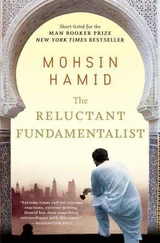The encounter takes place in a house that is remarkable only for the two men with assault rifles who loiter outside. The faction head sits on a carpet under a slow-moving fan. He rises, shakes your hand with a mangled but healed appendage missing two of its fingers, and watches you appraisingly. Settling yourself beside him, you explain your predicament.
The faction head is inclined to help, first because you will pay, and second because you are kin, and third because he sees you as an underdog and he regards himself as a champion of underdogs, and fourth because the businessman who threatened you belongs to a sect the faction head believes deserving of extermination. But he tells you none of this immediately. Instead he informs you of his decision the next day, having in the meantime, since he is middle management, conferred with his superiors, and also having let you sweat.
You are given a guard for your personal security and an unelaborated verbal guarantee of further measures should the situation escalate. The guard arrives unannounced at your office, so quiet and calm as to be virtually opiated, but with sharp, unsmiling eyes. He is roughly your age though significantly heavier, packing a barrel stomach and four silver teeth. You cannot imagine him a father or a husband, so you do not ask him about his family, and he, for his part, makes no small-talk either. He spends the nights at your home, but even with him outside, in your single and otherwise unoccupied servant quarter, it troubles you to have this man living near your wife.
Whenever he sits in your car, the guard cocks his automatic noisily between his legs, whether for effect or to improve his reaction time or simply out of habit, you are not entirely sure. You wonder if you have made a mistake by engaging him, as the expense is crippling and he makes you uncomfortable besides. But, as you see it, your only alternatives are to ignore the threat, which might be suicidal, or to back down and submit to your rival, which would be unfair and a blow to your pride. Once, as you intentionally drive by the businessman’s walled villa, an acre of prime property in an upscale district, you glimpse him through a closing gate power-walking on his lawn. His gray tracksuit and blue hand weights are evocative of a certain type of filmic villain, and this sight steels you in your determination not meekly to surrender.
Your wife knows that something is bothering you, perceiving you to be distant and uncharacteristically irritable, and she recognizes it is not without significance, of course, that her husband has newly retained a guard. She desires to be a comfort, and when her attempts to engage you in conversation fail to elicit an explanation of what is the matter, she takes another tack, proposing that the two of you go out to see a movie, or dine at a restaurant, but you are adamant about spending evenings at home, for security reasons, although you do not tell her this last, not wanting to frighten her.
The imported glossy magazines she reads offer advice on what to do in this situation, how to please your man when he seems unpleased, and so, greatly daring, as your anniversary approaches, she instructs her waxing lady to remove all of her pubic hair, a bracingly painful experience, purchases with the entirety of her month’s pocket money an expensive, lacy set of bra and panties, in violet, her favorite color, and waits for you on your bed, semi-undressed, in the glow of flickering candles.
She is unaware that the electricity has gone out, and so is taken aback when you enter the room holding a portable, battery-powered tube light, and you, for your part, are embarrassed at having stumbled in on her unannounced, and so you avert your eyes, muttering an apology, and head straight for the bathroom. When you return she is covered to her chin with a sheet, her eyes big in the dimness, a sense of humiliation washing over her, and yet, when you lie down, she reaches deep within, and, summoning extreme reserves of willpower, places your hand upon her chest and her hand between your legs, and she feels her body swelling and hardening to you, but not yours to her, overcome as you are by exhaustion and stress, and so she turns around and clenches her face against sound and wetness and pretends to go to sleep.
For you the weeks pass in fraught tension, your gaze incessantly flicking around you as you drive, wondering whether you will be attacked, and wondering also what, if anything, your guard will be able to do to protect you. You tell yourself you will not give in to fear, but despite this you begin to cancel visits even to those corporate customers with which your firm has its most lucrative cooler-replenishment contracts. Your business suffers as a result, as your days take on a more and more rigid schedule of early to work, stuck in the office, and late to home.
This routine is initially broken not by an act of violence but by the death of your sister. The arrival of the monsoon has brought with it sudden floods, and while the houses of your ancestral village, through a blessing of topography, have mostly been spared, resultant pools of stagnant water have bred armies of disease-carrying mosquitoes. Your sister is killed by dengue, her high fever relenting, and briefly offering false hope, before internal bleeding starves her organs and causes them to fail.
You travel on a series of lurching buses with your brother and his sons, themselves now nearly men, not reaching your destination until the following evening because of rain-damaged roads and bridges. The funeral has been delayed to make possible your presence, and thus you are able to see your sister one final time, a woman old without having been so long on this world, her white hair sparse and front teeth missing, the flesh of her face sunken to her bones, as if deflated by the passing of her life.
Looking at your brother, you observe that he too has aged, though even as a young man he tended not to seem young, and you wonder how you must appear to your nephews. You offer your prayers at the flower-strewn mound of earth that caps your sister’s resting place, and you give the money you have brought to her husband and children. Death in the village, being common, is handled in a matter-of-fact manner, and after the first few days you witness no wailing, even if a tear is shed by your eldest niece when she bends to allow you to place a palm on her head as you depart.
You left your wife behind in the city, a decision experienced by her as hurtful, despite your claim that the journey would be too arduous because of the floods. She finds it shocking you did not want her present on such an important occasion, unknowing that your true motivation was your wish to conceal somewhat the shabbiness of your origins.
As you return, slowly, through innumerable blockages, dismounting to help heave vehicles free of treacherous mud, you are reminded again of the yawning gap that exists between countryside and city, of the intensity with which here eyes follow a goat, the sole survivor of its swept-off herd, while there existence continues largely unchanged.
Later that week the boyish gunman is once more given instructions to encounter you. He washes and dresses as usual, listening to movie songs on a promotional soda-can-shaped radio and shaving above his upper lip in the aspiration of one day provoking a mustache. His mother and sister bid him good-bye. He is low on funds and so he purchases only a small quantity of petrol for his motorcycle and a single loose cigarette. He chooses an intersection on your route with a giant billboard advertising antibacterial soap, and waits, smoking, a new habit good for making him forget that he is hungry. His phone beeps to inform him you are on your way.
The gunman’s mind lingers on a T-shirt he had been wanting, purple, with a psychedelic hawk, but it was gone when he passed by the store today, and the shopkeeper said it was sold. He wishes he had been able to buy it. He should have borrowed the money. There is a girl with dimples from his neighborhood he has not had the courage to speak to, and she never seems to notice him, but he is sure she would have in that T-shirt.
Читать дальше












